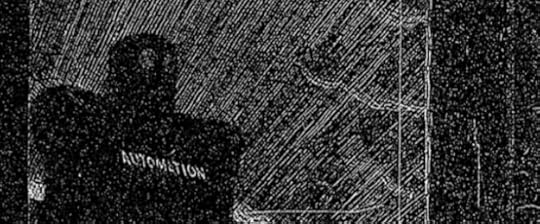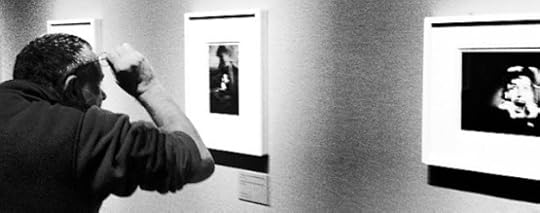Nicholas Carr's Blog, page 15
July 14, 2016
Art in an age of augmentation
“Instagram shows us what a world without art looks like.” –Theses in Tweetform, #19
Ricky D’Ambrose, in “Instagram and the Fantasy of of Mastery,” adolefulessay in The Nation, examines what he sees asa fundamental shift in aesthetics:“the transitionfrom art, long vaunted as a special, and autonomous, area of sensuous intelligence, to creativity, to which art can only ever be superficially related.” Society’s venerationof the overlay, thetemplate, thefilter, is on the rise, inexorably it seem...
July 3, 2016
Tesla and the glass cockpit problem
When the news spread last weekabout the fatal crash of a computer-driven Tesla, I thought of a conversation I had a couple of years ago with a top computer scientist at Google. We were talking about some recent airliner crashes caused by“automation complacency” — the tendency for even very skilled pilots to tune out from their work after turning on autopilot systems — and the Google scientist noted that the problem of automation complacency is even more acute for drivers than for pilots. If y...
June 26, 2016
After math
Will Davies cuts through the prevailing emotionalism in dissecting the Brexit vote:
The Remain campaign continued to rely on forecasts, warnings and predictions, in the hope that eventually people would be dissuaded from ‘risking it’. But to those that have given up on the future already, this is all just more political rhetoric. In any case, the entire practice of modelling the future in terms of ‘risk’ has lost credibility, as evidenced by the now terminal decline of opinion polling as a to...
June 15, 2016
The global village of violence
We assume thatcommunication and harmony go hand in hand, like a pair of flower children ona garden path. If only we all couldshare ourthoughts and feelings with everyone else all the time, we’d overcome our distrust and fear and live together peaceably. We’d see that weare all one. Facebook disabuses us of this notion.To be “all one” is to be dissolved — and for manypeople that isa threat that requires a reaction.
Eamonn Fitzgerald points to a video of a Canadian TV interview with Marshall M...
June 9, 2016
The explainable
Signature has an interview with Denis Boyles about his new book on the eleventh edition of the Encyclopedia Britannica, Everything Explained That Is Explainable.The title of Boyles’s book was one of the marketing slogans used to sell the encyclopediawhen itwent on sale in 1910 and 1911. In the interview, Boyles talks about how the monumental reference work was very much a reflection of its time:
Signature:It was a period of great change. The 11thwas essentially published in the heart of the...
June 8, 2016
Technological unemployment, then and now
In “Promise and Peril of Automation,” an article in the New York Times, David Morse writes:
The key area of social change stimulated by automation is employment. Everywhere one finds two things: a positive emphasis on opportunity and a keen sensitivity to change, often translated more concretely into fear.
The emphasis on opportunity is welcome and indicative of the climate in which automation will come to maturity. The sensitivity to change is equally significant. If fears about the future,...
June 7, 2016
The width of now
“Human character changed on or about December 2010,”writesEdward Mendelsonin“In the Depths of the Digital Age,“when everyone, it seemed, started carrying a smartphone.”
For the first time, practically anyone could be found and intruded upon, not only at some fixed address at home or at work, but everywhere and at all times. Before this, everyone could expect, in the ordinary course of the day, some time at least in which to be left alone, unobserved, unsustained and unburdened by public or fa...
May 31, 2016
Just Google it
From Michael S. Evans’s review of Pedro Domingos’s The Master Algorithm:
For those in power, machine learning offers all of the benefits of human knowledge without the attendant dangers of organized human resistance.The Master Algorithmdescribes a world in which individuals can be managed faster than they can respond. What does this future really look like? It looks like the world we already have, but without recourse.
May 26, 2016
Framed and shot
“From the very beginning of her career,” writes Arthur Lubow, of Diane Arbus, “she was taking photographs to obtain a vital proof — a corroboration of her own existence. The pattern was set early. When she was 15, she described to a friend how she would undress at night in her lit bathroom and watch an old man across the courtyard watch her (until his wife complained). She not only wanted to see, she needed to be seen.”
The bathroom was a camera, in which the girlcomposed an image of herself...
May 24, 2016
The future of Facebook is more bias, not less
“What makes social media unique,” writesMark Zuckerberg in defending Facebook against charges of an anti-conservative slantin its promotion of “trending” news stories, is that “we are one global community where anyone can share anything—from a loving photo of a mother and her baby to intellectual analysis of political events.” The ideal of a global community of unfettered sharers, all equal in their sharing ability, is “the core of everything Facebook is,” he continues. “Every tool we build...









